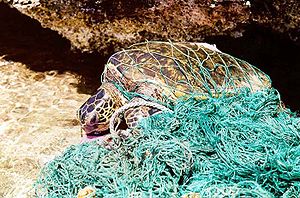編者前言:在海上漂流的廢棄船隻,俗稱「幽靈船」,是普遍流傳在跑海人之間奇聞軼事的主角。而聯合國發現,在海上漂流的廢棄漁具,也常成為「幽靈漁具」,即使已無人在使用,卻仍持續進行「漁撈」的活動。

纏住海龜的「幽靈漁網」。照片來源:NOAA
聯合國糧食與農業組織(FAO)及聯合國環境規劃署(UNEP)5月6日聯合發表的一項報告指出,漁民所遺失或拋棄的漁具,在過了很長時間之後仍然持續對海洋環境造成傷害,這樣的「幽靈漁撈」(ghost fishing)使魚類族群逐漸枯竭,也使船隻暴露在危險的狀況中。
在多個國家5月中旬齊聚在印尼馬納都(Manado)舉行「全球海洋大會(World Oceans Conference)」之際,這份新的報告來得正是時候。在這次會議中,重建健康海洋環境的議題將會是議程的主軸。
這份報告發現,大部分的漁具並不是故意被棄置的,而是在暴風雨或強烈的洋流中流失,或是因為漁具之間互相撞擊,例如用漁網捕撈時,一些區域在海床已部署的魚柵(fishing traps)會與這些流失的漁具互相糾纏。

遭「幽靈漁網」纏死的鱈魚。攝影:Pete Naylor。來源:REEF
報告指出,在過去,未被妥善運作的流網(drift nets)是禍首,但是1992年一項禁止在許多區域使用流網的法令已經降低這些漁具造成的幽靈漁撈狀況。
刺網(gill nets)、漁籠(fishing pots)與漁柵最有可能造成「幽靈漁撈」,持續攔住陸續游過的魚類、海龜、海鳥及海洋哺乳類動物,使它們被網子絆住而終至死亡。
在美國最大的河口乞沙比克灣(Chesapeake Bay),每年總共部署約50萬個蟹籠(crab traps),估計其中約有15萬個流失。而僅僅在加勒比海法屬瓜德洛普群島(Caribbean island of Guadeloupe),每年就大約有20萬套漁柵在一季颶風之後流失,損失比例大約是50%。就像刺網一樣,這些漁柵會再持續自行漁撈一段很長時間。
延繩釣漁具較有可能纏住海洋生物,拖網則很有可能傷害海洋下層的棲息地(sub-sea habitats)。
聯合國部門報告說,棄置、流失及丟棄漁具的問題越來越嚴重,因為全球漁撈作業規模越來越大,所採用的漁具多以耐久性的合成材料製成,非常耐用。
聯合國環境規劃署首長史坦納(Achim Steiner)表示:「在海洋環境機器中有許多鬼魅,從過度漁撈到海洋酸化;其中海洋酸化與溫室氣體及海洋中缺氧死亡層(de-oxygenated dead zones)的上升有關,這是因為河水入注與陸地產生的污染物所造成。」
史坦納指出:「如果我們海洋的生產力要延續給這一代及未來的世代,漁具的棄置及流失會是許多亟需共同對付的系列挑戰的一部份,特別是為了要達成聯合國千禧年發展目標(UN Millennium Development Goals)。」
這份報告估計,在眾海洋中遭棄置、流失或被丟棄的漁具約占所有海洋垃圾的10%(大約有64萬公噸)。
聯合國糧食與農業組織助理漁業與農業組主任野村(Ichiro Nomura)表示:「如果國際社會不採取有效的作為來整體性地處理海洋垃圾,留置在海洋環境中的漁具將會持續累積,而其對海洋生態系的衝擊也會持續惡化。」
Long after fishing gear is lost at sea or abandoned by fishers it continues to harm the marine environment, depleting fish populations through "ghost fishing" and posing a hazard to ships, finds a new joint report released today by the UN Food and Agriculture Organization and UN Environment Programme.
The new report comes as nations prepare to gather for next week's World Oceans Conference in Manado, Indonesia, where the restoration of healthy marine environments will be high on the agenda.
The report finds that most fishing gear is not deliberately discarded but is lost in storms or strong currents or results from gear conflicts - fishing with nets, for instance, in areas where bottom traps that can entangle them are already deployed.
In the past, poorly operated drift nets were the prime culprits, but a 1992 ban on their use in many areas has reduced their contribution to ghost fishing.
Gill nets, fishing pots and traps are most likely to "ghost fish," continuing to catch continued fish, turtles, seabirds, and marine mammals, which are trapped in the nets and die, according to the report.
In the largest U.S. estuary, Chesapeake Bay, an estimated 150,000 crab traps are lost each year out of an estimated 500,000 total deployed.
On just the single Caribbean island of Guadeloupe, about 20,000 of all traps set each year are lost each hurricane season - a loss rate of 50 percent. Like gill nets, these traps can continue to fish on their own for long periods of time.
Longlines are more likely to ensnare other marine organisms and trawls are most likely to damage sub-sea habitats.
The problem of abandoned, lost and discarded fishing gear is getting worse due to the increased scale of global fishing operations and the introduction of highly durable fishing gear made of long-lasting synthetic materials, the two UN agencies report.
"There are many ghosts in the marine environment machine from overfishing and acidification linked with greenhouse gases to the rise in de-oxygenated dead zones as a result of run off and land-based source of pollution," said UNEP head Achim Steiner.
"Abandoned and lost fishing gear is part of this suite of challenges that must be urgently addressed collectively if the productivity of our oceans and seas is to be maintained for this and future generations, not least for achievement of the UN Millennium Development Goals," said Steiner.
Abandoned, lost or discarded fishing gear in the oceans makes up around 10 percent (640,000 metric tonnes) of all marine litter, the report estimates.
"The amount of fishing gear remaining in the marine environment will continue to accumulate and the impacts on marine ecosystems will continue to get worse if the international community doesn't take effective steps to deal with the problem of marine debris as a whole," said Ichiro Nomura, FAO assistant director-general for fisheries and aquaculture.





